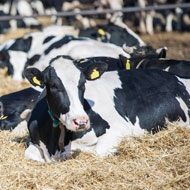World-leading livestock research centre to be built

Phase one of the project will see the development of specialised suites and equipment, allowing research on large animal metabolism and infectious disease.
The Roslin Institute will receive funding of £11.3 million to put towards a world-leading Large Animal Research and Imaging Facility (LARIF).
Total funding of £27.7 million has been awarded to the Centre of Innovation Excellence in Livestock (CIELivestock), in order to set up state of the art facilities across the country. From its inception, the centre has been industry-led and aims to provide research that will support the needs of the industry.
Additional funding has been granted by participating research institutions and industry for projects being carried out at the centre, bringing the total investment to more than £70 million.
Edinburgh's Roslin Institute is the largest recipient of funding to build LARIF at its Easter Bush Campus. Phase one of the project will see the development of specialised suites and equipment, allowing research on large animal metabolism and infectious disease.
The institute will also be given funding to host CIELivestock's informatics hub, supporting livestock genomics and informatics and providing training to individual breeders, farmers, recording and breeding companies in their delivery of genomic improvement.
Other recipients of investment are the universities of Leeds, Nottingham, Newcastle, Aberystwyth, Bristol, Queens (Belfast) and Harper Adams, as well as some of the UK's key research organisations, such as Scotland's Rural College, Duchy College and the Agri-Food and Biosciences Institute Northern Ireland.
David Hume, director of the Roslin Institute, said: "The formation of CIELivestock, and the matching investments by University of Edinburgh and SRUC will cement the world-leading position of the Easter Bush Campus in animal sciences research.
"The partnerships with industry and with other research organisations across the UK, will secure an effective path from discovery to translation, ultimately supporting new industries and benefiting UK livestock farmers."



 The Federation of Independent Veterinary Practices (FIVP) has announced a third season of its podcast, Practice Matters.
The Federation of Independent Veterinary Practices (FIVP) has announced a third season of its podcast, Practice Matters.